
Twenty-four young women are poised to make history in Sri Lanka as members of a pioneering team of tea plantation Field Supervisors. This is the first time in the country’s centuries-old plantation industry that women are taking up supervisory positions.
“Kankanis’ or field supervisors are generally male. We have experienced that wherever women tend to lead, there is more cohesion and understanding. As a result, it is a win-win for both parties,” said Dr. Roshan Rajadurai, Managing Director of Hayleys Plantations
Women working as tea pickers form the single largest segment of the plantation workforce in Sri Lanka, with little room to progress in their careers.
“I wanted to give women equal opportunities for their future growth. We created a career path for young women - beginning as trained field supervisors and steadily reaching executive positions. It’s the first initiative of its kind in the plantation industry,” added Senaka Alawattegama, Director/CEO of Talawakelle Tea Estates PLC
“Posters came up on the estate inviting us to apply for the training and gatherings were held to motivate us,” says Kumudini, from the first batch of trainees. “The estate management encouraged the children of manual grade employees to apply. And so, I did. My parents are proud that I will soon become a field supervisor with a sense of direction. I will focus on my work, perform well, and one day become a Manager.”
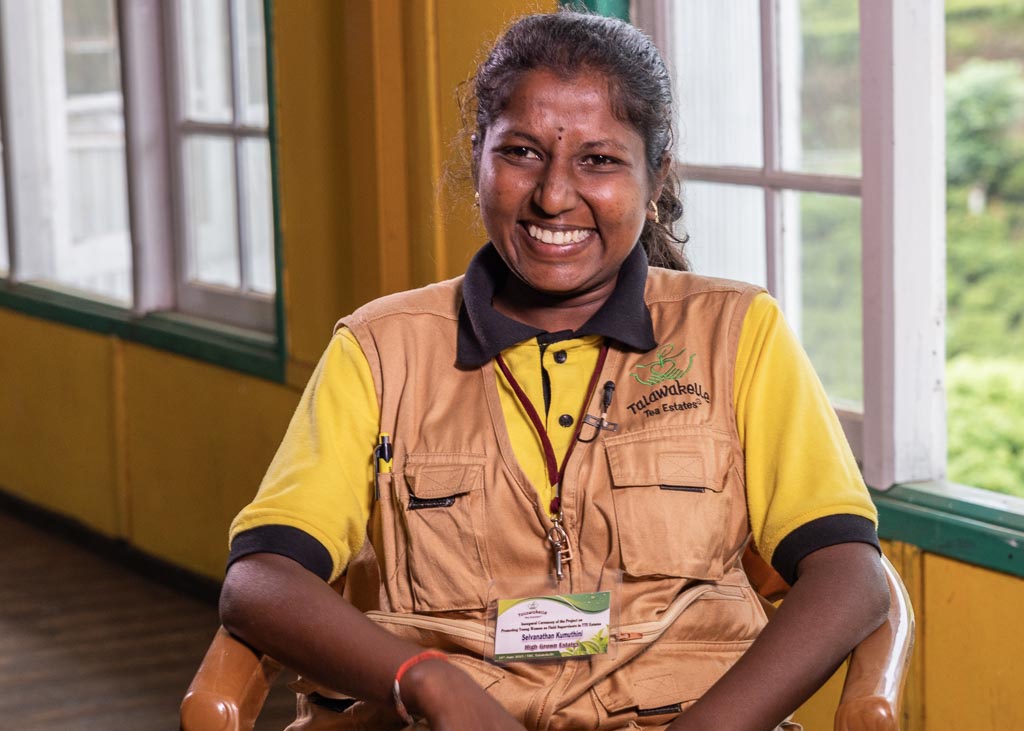
Kumudini was hesitant to apply for the training programme until she participated in a motivational meeting
“This was an entirely new experience,” remarks Shanika Dananjani. “I’ve learnt a lot about the different aspects of the tea industry, across the production process – from the tea fields to the factory. We gained both theoretical and practical knowledge. And we will continue to learn.” The women will undergo a further nine months of on-the-job training.
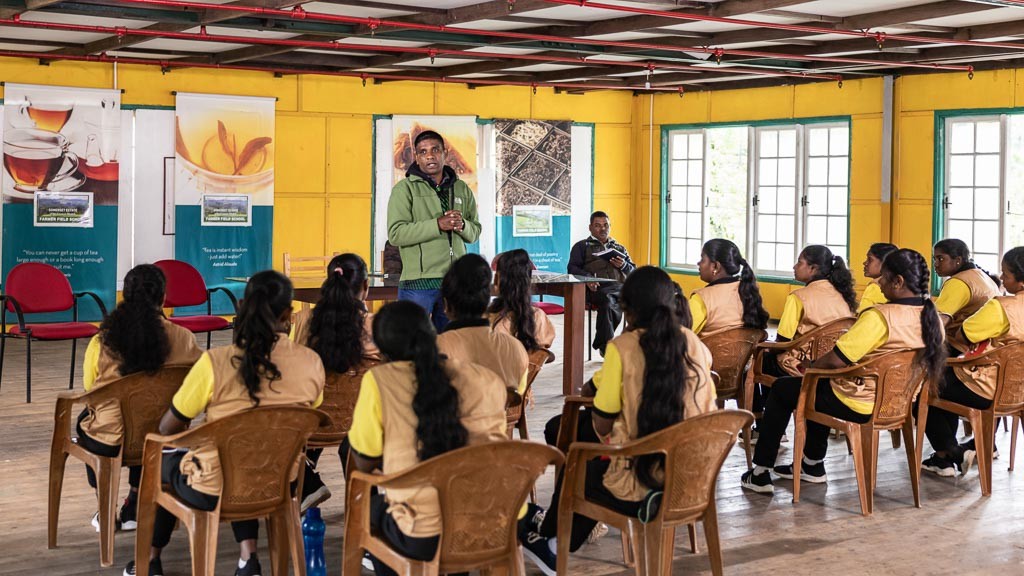
Subramaniyam Ram - Senior Manager, Human Resource Development, underscores the importance of creating a more equitable plantation community
“This is a significant moment in the history of plantations,” states Subramaniyam Ram, Senior Manager, Human Resource Development, of the Talawakelle Tea Estates PLC. “This year, the plantation community is celebrating its 200th year. And it’s the 156th year of commercialised plantation.” He points out, however, that workforce concerns persist.
“Over the years, women occupied in manual work have been resigned to difficult working conditions and limited prospects. Moreover, they have been supervised, monitored, instructed, and commanded by men. The tea industry in Sri Lanka is a patriarchal and male-dominant culture, with women experiencing discrimination both at home and in the workplace. As a responsible plantation company concerned about the well-being of its community, we wanted to address both these issues.”
Subramaniyam Ram, Senior Manager, Human Resource Development, of the Talawakelle Tea Estates PLC
Talawakelle Tea Estate PLC’s pathbreaking initiative that clearly signalled a positive change for the coming generations was recognised by the Child Rights in Business (CRIB) Challenge launched by The Centre for Child Rights and Business in collaboration with Save the Children. The plantation company is also a member of the Mother and Child-Friendly Seal for Responsible Business initiative, which is committed to improving the lives of women, children, and families in plantation communities by addressing a particular issue or a range of them through decisive, ongoing action.
“This is transformative,” says V. Weerasingham, a gender equality and conflict sensitivity specialist and trainer who had thought-provoking conversations with the trainees. “Not much has changed for women in the plantation sector since the beginnings of the industry. There are no women in decision-making and supervisory positions in the field. It’s time for change. But there will be challenges to face and we need to be prepared for that.”
In fact, baseline surveys conducted before the training was initiated indicated a certain scepticism among both younger and older men. They expressed the view that these were roles designated for men and that some men may be reluctant to follow instructions given by women.
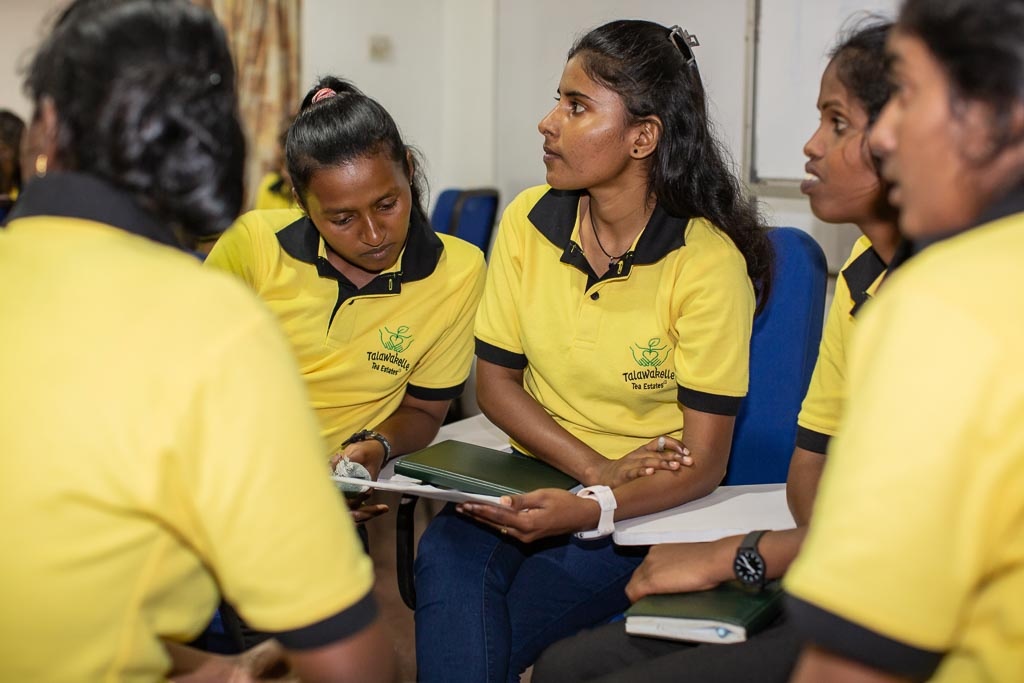
Gender analysis and confidence building is a key part of the training
“We are breaking certain traditional barriers. I completed my A-levels, got married, and found work in a bookshop. But I longed for a more active job outdoors, a more responsible one. This is a good employment opportunity for women. I am becoming more and more confident about my ability to do this job well,” said Madushani Nilmini, who had, from her childhood, wanted to work as a field officer on an estate.
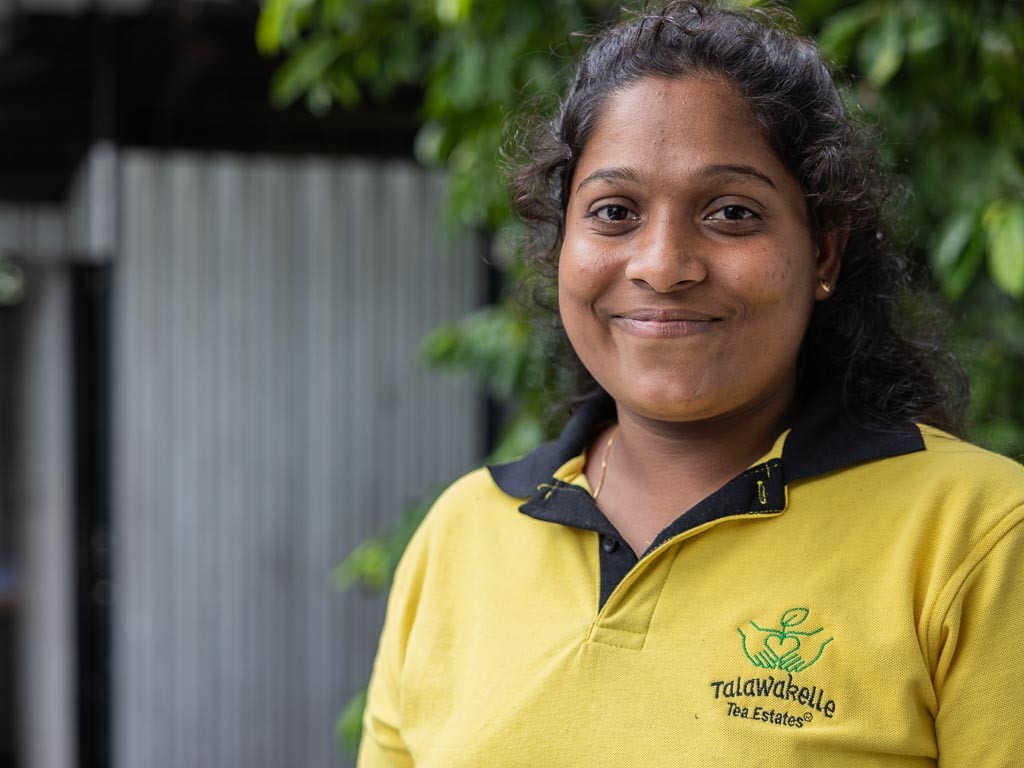
Madushani Nilmini sees her colleagues and herself as proof that women can take on difficult challenges
Soon after graduating with a degree in Human Resources, Sri Abhirami joined the regional office of the Talawakelle Tea Estates PLC as a Human Resource Assistant. One of her first tasks was coordinating the training for female supervisors.
“The participants include those who have passed their O-levels and A-levels. The training is highly professional and there will be additional benefits from the appointment of women supervisors: “I think the women tea pickers will more easily share their problems with the female supervisors. And I believe this will facilitate to reduce gender-based issues.”
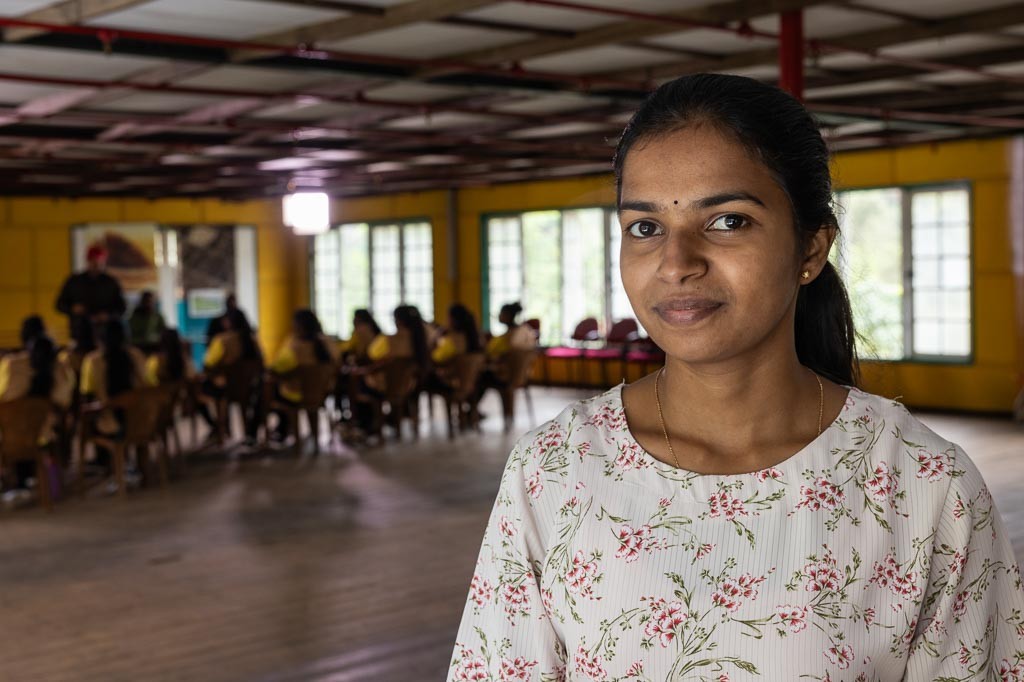
Abhirami has been closely following every aspect of the training and can see its importance for the young women as well as their community
“I am grateful for this opportunity. I am a girl of the plantations. I was born on the estate, grew up here with my parents who provided labour to the estate, and now I am about to become a member of its staff. It is hard for me to convey how I feel. As a woman, I feel a huge sense of achievement. We are sharing our experience with other girls as well and informing them that there are opportunities opening up for us. Now it’s our turn to motivate them,” said Nishanandani.
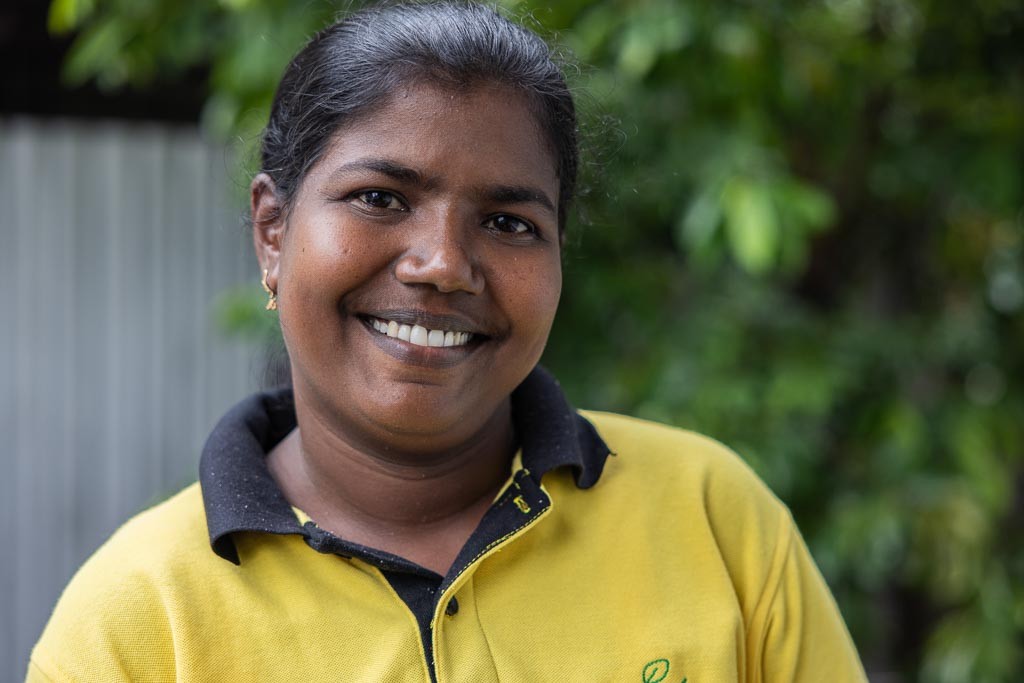
Nishanandani values her learning experience and wants to encourage others to follow
Sangeetha Dharmasekara, Deputy General Manager - Human Resources of Talawakelle Tea Estates PLC says that more than 400+ applications were received for this programme, and with more difficulty finally selected the crème de la crème of 24 women, after multiple stages of interviews conducted by the well experienced Senior Estate Managers. The initial 3-month training was a comprehensive introduction to the production of tea, with the estate collaborating with the Tea Research Institute, Department of Labour, National Institute of Labour Studies and The Centre for Child Rights.
She also feels optimistic about the company’s ability to provide young women with leadership and work opportunities that enable them to become role models for change.
“As pioneers, we know that there will be some challenges; but we have a very clear strategic plan to overcome this. As a Female and as the Head of HR, I will guide all of them for their continuation and success; whilst empowering them to build their level of confidence. We believe we will inspire other plantation companies as well. This is just the beginning. We have many more plans in place,” said Sangeetha Dharmasekara, Deputy General Manager - Human Resources of Talawakelle Tea Estates PLC.
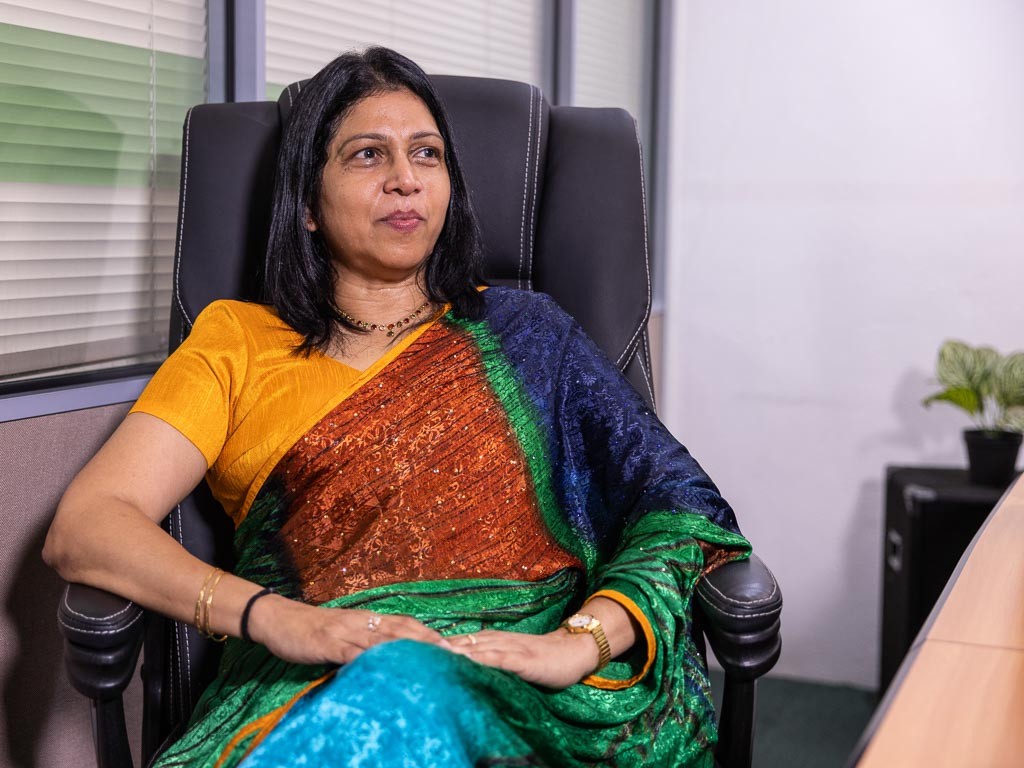
Sangeetha Dharmasekara, Deputy General Manager - Human Resources, is proud of her company’s exemplary initiative
The Mother and Child-Friendly Seal for Responsible Business is a collaborative initiative between The Centre for Child Rights and Business, Save the Children, and key stakeholders in the Sri Lankan tea industry. It aims to improve the well-being of families in Sri Lanka’s tea-growing communities through sustainable and meaningful investments by business entities in the tea supply chain (buyers, brands, plantation companies).
More information:
By using this website, you agree to our use of cookies. We use cookies to provide you with a great experience and to help our website run effectively.